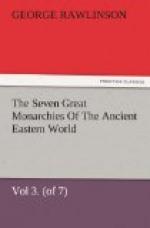The long reign of Astyages seems to have been almost undisturbed, until just before its close, by wars or rebellions. Eusebius indeed relates that he, and not Cyaxares, carried on the great Lydian contest; and Moses of Chorene declares that he was engaged in a long struggle with Tigranes, an Armenian king. But little credit can be attached to these statements, the former of which contradicts Herodotus, while the latter is wholly unsupported by any other writer. The character which Cyaxares bore among the Greeks was evidently that of an unwarlike king. If he had really carried his arms into the heart of Asia Minor, and threatened the whole of that extensive region with subjugation, we can scarcely suppose that he would have been considered so peaceful a ruler. Neither is it easy to imagine that in that case no classical writer—not even Ctesias—would have taxed Herodotus with an error that must have been so flagrant. With respect to the war with Tigranes, it is just possible that it may have a basis of truth; there may have been a revolt of Armenia from Astyages under a certain Tigranes, followed by an attempt at subjugation. But the slender authority of Moses is insufficient to establish the truth of his story, which is internally improbable and quite incompatible with the narrative of Herodotus.
There are some grounds for believing that in one direction Astyages succeeded in slightly extending the limits of his empire. But he owed his success to prudent management, and not to courage or military skill. On the north-eastern frontier, occupying the low country now known as Talish and Ghilan, was a powerful tribe called Cadusians, probably of Arian origin, which had hitherto maintained its independence. This would not be surprising, if we could accept the statement of Diodorus that they were able to bring into the field 200,000 men. But this account, which probably came from Ctesias, and is wholly without corroboration from other writers, has the air of a gross exaggeration; and we may conclude from the general tenor of ancient history that the Cadusians were more indebted to the strength of their country, than to either their numbers or their prowess, for the freedom and independence which they were still enjoying. It seems that they were at this time under the government of a certain king, or chief, named Aphernes, or Onaphernes. This ruler was, it appears, doubtful of his position, and, thinking it could not be long maintained, made overtures of surrender to Astyages, which were gladly entertained by that monarch. A secret treaty was concluded to the satisfaction of both parties; and the Cadusians, it would seem, passed under the Medes by this arrangement, without any hostile struggle, though armed resistance on the part of the people, who were ignorant of the intentions of their chieftain, was for some time apprehended.




